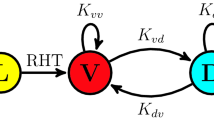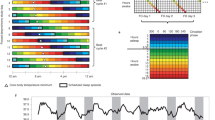Abstract
IN laboratory investigations of biological rhythmicity, changes in ambient illumination are usually brought about by turning lamps on and off1. The responses of deer mice to artificial bright–dim light cycles with simulated twilight transitions are at present being examined in this laboratory.
This is a preview of subscription content, access via your institution
Access options
Subscribe to this journal
Receive 51 print issues and online access
$199.00 per year
only $3.90 per issue
Buy this article
- Purchase on Springer Link
- Instant access to full article PDF
Prices may be subject to local taxes which are calculated during checkout
Similar content being viewed by others
References
Cold Spring Harbor Symposia Quant. Biol., 25 (1960).
Aschoff, J., Naturwiss., 41, 92 (1954). Tribukait, B., Z. vergl. Physiol., 38, 479 (1956).
Kavanau, J. L., Behaviour (in the press).
Kavanau, J. L., Ecology, 43, 161 (1962); other papers submitted for publication.
Kimball, H. H., Monthly Weather Rev., 44, 12, 614 (1916).
Blair, W. F., J. Wildlife Management, 7, 92 (1943).
Brown, L. E., Proc. Zool. Soc. Lond., 126, 549 (1956). Pearson, O. P., J. Mammal., 41, 58 (1960).
Author information
Authors and Affiliations
Rights and permissions
About this article
Cite this article
KAVANAU, J. Twilight Transitions and Biological Rhythmicity. Nature 194, 1293–1295 (1962). https://doi.org/10.1038/1941293a0
Issue Date:
DOI: https://doi.org/10.1038/1941293a0
This article is cited by
-
Circadian misalignment on submarines and other non-24-h environments – from research to application
Military Medical Research (2020)
-
Effects of twilights on circadian entrainment patterns and reentrainment rates in squirrel monkeys
Journal of Comparative Physiology A (1996)
-
Running activity mediates the phase-advancing effects of dark pulses on hamster circadian rhythms
Journal of Comparative Physiology A (1989)
-
The influence of artificial and natural short photoperiods on male syrian hamsters: Reproductive effects
International Journal of Biometeorology (1984)
-
Scorpion lateral eyes: Extremely sensitive receptors of Zeitgeber stimuli
Journal of Comparative Physiology ? A (1977)
Comments
By submitting a comment you agree to abide by our Terms and Community Guidelines. If you find something abusive or that does not comply with our terms or guidelines please flag it as inappropriate.



